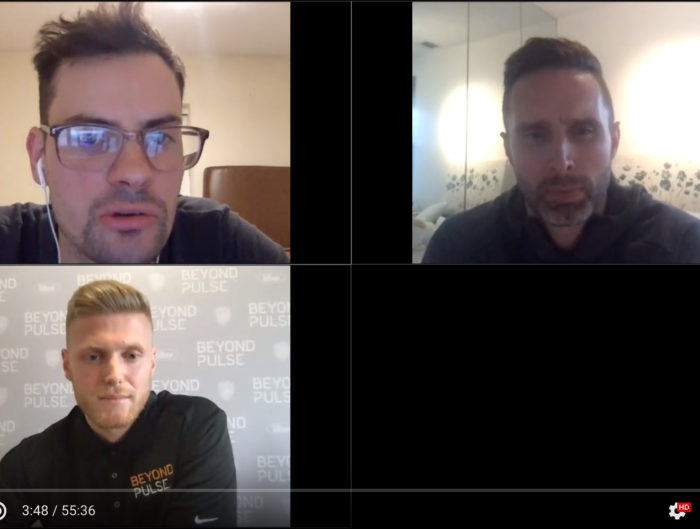The role of a team captain is far from ordinary. It carries with it a multitude of responsibilities that extend beyond the boundaries of the soccer field. Today, we’re highlighting the leadership and the indomitable spirit of Bianca Revenga, the team captain of the Felician University Women’s Soccer Team.
With unwavering dedication and an infectious drive, Bianca has taken her team to new heights, both on and off the field. In this interview, she opens up about her personal journey as a soccer player, the challenges she faced, and her experience stepping into the role of team captain.
Meet Bianca Revenga

Bianca is a dynamic midfielder whose commitment has propelled her team to success, both on and off the soccer field.
Hailing from the vibrant city of Caracas, Venezuela, this 21-year-old powerhouse has emerged as a senior captain at Felician University, where she is pursuing a degree in Biology (Pre-physical Therapy).
With a remarkable journey that includes regional championship triumphs and a prestigious Venezuelan National title, Bianca’s passion for the beautiful game has guided her towards an exceptional path of leadership and excellence.
Bianca’s go-to mantra is “Be 1% better every day.”
From the early stages of her soccer career, Bianca showcased her extraordinary talent and dedication.
Q: How long have you been playing soccer, and what initially sparked your interest in the sport, Bianca?
A: Soccer has been a part of my life since I was around 6 years old because my younger brother started playing soccer and he and I loved to play against each other. Since then I attended almost every game my brother played and I was always interested in learning more. But in Venezuela, women’s soccer was not a big sport so I officially started playing when I was 14 years old when my brothers academy opened a girls’ team.
So, Bianca officially embarked on her remarkable journey as a player.
Q: What was your recruitment journey like? When did you know you wanted to play at the university level?
A: When I was in my senior year of high school my coaches started talking to me about the possibility of playing soccer outside Venezuela. I wanted to get a degree so becoming a student -athlete in the US was the best choice for me. After that, BK2, a company that focuses on bringing student-athletes to America, contacted me and I decided to work with them. They basically helped me contacting coaches, making my recruiting video and then giving me the best options possible for my development as a player but also as a student. I had a feeling that I wanted to play in college so I always worked and trained very hard in order to achieve it.
Bianca’s ascension to the role of team captain at Felician University Women’s Soccer Team was marked by her growth and an unwavering display of leadership qualities.
Q: Can you tell us a little bit about how you became the team captain of the women’s soccer team at Felician University?
A: After my freshman year both of the captains were graduating so the team needed a new captain. When the season ended Coach Aris (Felician’s past coach) saw in me qualities that would make a good captain and he gave the position to me. At first I was very nervous because I did not want the team to treat me differently or to think that I did not deserve the position. But they were very helpful and everyone was very happy for me! When Coach Scott took the role as head coach of Felician University he saw the same qualities in me so he kept me as a captain with Ariana Monge, Nicole Jenal and Isabella Bertossi. Three amazing teammates that make this captain group work as good as it does.
As captain, Bianca embraces a range of key responsibilities that play a vital role in shaping the team’s dynamics and fostering an environment of growth and achievement.
Q: As the team captain, what are some of your key responsibilities and how do you approach them to ensure the success and unity of the team?
A: Some of my key responsibilities are ensuring work rate, helping the team on and off the field, being an example. I approach my teammates with a smile and the right attitude as being a college athlete is a privilege and being able to do what you love every day makes it all worth it.
What sets apart a team captain at the collegiate level? For Bianca, there are three to five qualities that she believes are indispensable for success in this pivotal role.
Q: What are the top 3-5 qualities or characteristics you believe are essential for a successful team captain in soccer, and how do you strive to embody these qualities?
A: The top qualities I believe are essential for a successful team captain in soccer are: leadership, communication, decision-making and resilience. Being a captain has definitely been a learning experience and I have gained a lot of knowledge from my coaches, feedback from the team and from captains that I had before.
Bianca’s journey as a team captain has not been without its challenges. Striving for perfection, she confronted her own inner critic, learning valuable lessons about self-acceptance and the inevitability of ups and downs.
Q: Could you share some of the challenges you have personally faced as a team captain and how you overcame them? What lessons have you learned from these experiences?
A: My biggest challenge as a team captain was understanding that I am not perfect and I will never be. I am a person who always aims for perfection and when I felt I was not being the perfect captain I would get frustrated. I overcame this by talking with my teammates and explaining to them where my frustrations came from and they helped me understand that we can always aim for perfection but reaching it is very hard, we will always have ups and downs in life. This experience helped me move on as a student and as an athlete because it took a lot of pressure off my shoulders.
Recognizing the correlation between hard work and success, Bianca leads by example, demonstrating her own relentless commitment to improvement and motivating her teammates to do the same.
Q: How do you inspire and motivate your teammates to perform at their best on and off the field? Are there any specific strategies or approaches you find particularly effective?
A: The most effective way for me to motivate my teammates on and off the field is leading by example. I do this by inviting them to workout with me or to discuss our last soccer game for example. When my teammates see that I am doing it they feel more motivated than if they do it alone and it pushes us to do better as a group!
Bianca recalls a memory that reinforced her beliefs that perseverance and determination can overcome any obstacle.
Q: Can you recall a particularly memorable or defining moment during your time as the team captain? How did it impact you personally and the team as a whole?
A: The most memorable moment I’ve had as a team captain was beating Georgian Court University last season. We started losing that game 1-0 and we came back in the second half and won the game 2-1. This game showed the team that with resilience and hard work we can overcome every obstacle. Personally, it showed me that I have to keep fighting until the goals are achieved.
Clear and effective communication is vital for success in soccer teams, and a key pillar of good leadership.
Q: In your opinion, how important is effective communication within a team, and how do you ensure open and clear lines of communication among team members?
A: Effective communication is crucial in soccer teams. It ensures that players understand their roles, tactics, and objectives. Clear communication fosters collaboration, resolves conflicts, and builds trust. To promote open lines of communication, establish regular team meetings, encourage active listening, and provide clear expectations. Embrace technology tools for streamlined communication. As a captain, leading by example and prioritizing effective communication within the team.
Mastering the Art of Balancing Academics and Athletics: Bianca Revenga’s proven planner method.
Q: Balancing academics and athletics can be demanding. How do you manage your time to be present in the classroom and on the soccer field?
A: For me the easiest way to balance academics and athletics is keeping a planner that I update every week. This planner has everything that I will do every day of the week written down including my study time, soccer time and the time I need to dedicate to myself. For me it is easier to know what is coming ahead if I have everything written down and I am prepared for my practices, games, homework and exams with enough time.
Bianca’s key advice: Express yourself with confidence.
Q: What advice would you give to aspiring soccer players who aspire to become team captains or leaders in their own teams?
A: The biggest advice I would give is don’t be scared to voice your opinions and concerns but always in a positive way and in a way that does not hurt your teammates or coaches. My other advice is to be proactive for example by planning team events, helping coaches and even helping teammates with simple things like homework.
Be 1% better every day.
Q: Do you have a mantra or a quote that you “live by”? (one that you find most influential in terms of your soccer performance) or Is there a particular saying that serves as a driving force for you on the field?
A: My biggest mantra and something that makes me work on being better every day is a quote that one of my soccer coaches told me when I was back at home. The quote is “be 1% better every day”. I know that if I work to be 1% better every day I am always one step closer to my goals.
A note to players who aspire to be leaders…
Q: Is there anything else you would like to share with other players who may be aspiring to take on leadership roles in their respective teams?
A: Aspiring leaders in soccer teams, remember to lead by example, develop strong relationships, communicate effectively, embrace feedback, collaborate and empower teammates, learn from adversity, and continuously seek personal growth. Serve your team with humility and a genuine desire to help others succeed. Good luck on your leadership journey!

 FRA
FRA































